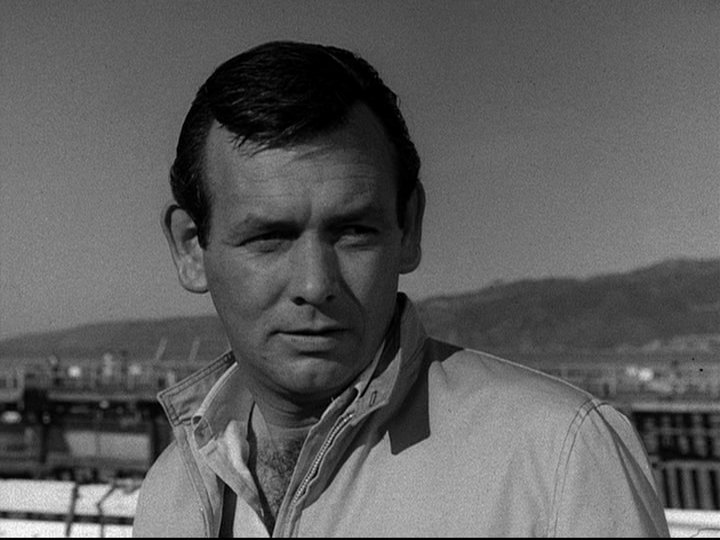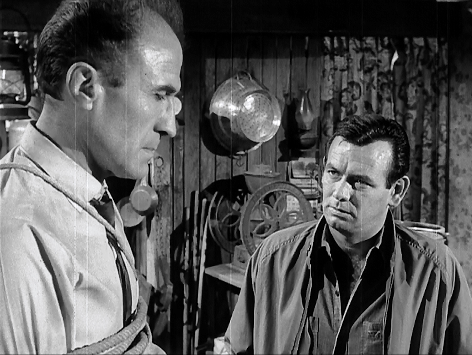For a 13-year-old kid who wanted nothing more than to flee the oppressive confines of his working-class New England hometown, reruns of “The Fugitive” provided an escapist road map.

Each afternoon after the final bell rang, I boarded the school bus and tried to be inconspicuous. Whenever possible, I took a window seat in the middle of the bus. To sit too close to the driver was cowardly and uncool. To sit in the back rows was brazen and risked provoking the bullies. The ideal seat was directly atop the cramped wheel well — the most uncomfortable spot for an aisle-seat passenger.
Once safely home, there was just enough time to tune the TV to the Arts & Entertainment Network before that familiar train whistle moaned and the baritone of William Conrad’s omniscient narrator boomed:
The name: Dr. Richard Kimble.
The destination: Death Row, State Prison.
The irony: Richard Kimble is innocent. Proved guilty, what Richard Kimble could not prove was that moments before
discovering his murdered wife’s body, he saw a one-armed man running from the vicinity of his home.
Besides being a damned good television show, “The Fugitive” served as a form of wish fulfillment for a disillusioned teenager who’d never been west of Niagara Falls. Never mind that Kimble was running from a death sentence: The idea that one could move to a different state and assume a new identity was tremendously appealing. It’s the reason why, around the same time, I began systematically reading Jack Kerouac novels like “On the Road,” “The Town and the City” and “The Dharma Bums” — all variations on the theme of the wandering male’s search for meaning.
As he crisscrossed the country during the show’s four seasons, searching for the one-armed man and evading Gerard, “the police lieutenant obsessed with his capture,” Kimble toiled at nearly a hundred blue-collar jobs under different aliases. In the first season alone, he’s a handyman, janitor, boxing cut man, sailmaker, liquor store clerk, lifeguard, gas station attendant and migrant farm worker, to name a few.
The pilot episode, which originally aired Sept. 17, 1963, set the template for the series. Kimble, alias James Lincoln, finds work as a bartender in Tucson, Ariz. He becomes romantically involved with a cocktail pianist, whose estranged and abusive husband tries to muscle Kimble out of town by putting the cops on his tail. Torn between flight and responsibility, Kimble puts himself in harm’s way to help the woman and her son.
The key to the series’ success lay in its two-pronged chase structure. At the same time he was being obsessively pursued by Lt. Gerard, Kimble was relentlessly seeking his wife’s killer. His desire to find the one-armed man and clear his name thus solved the basic narrative problem of why Kimble didn’t simply leave the country to get as far away from Gerard as possible.
The other brilliant decision was making the fugitive a former pediatrician. As a doctor of medicine, who took an oath to save the lives of others, it explains why Kimble often risked capture to help complete strangers.
While the stylistic influences of “The Fugitive” include gritty film noirs of the 1940s and ’50s and Alfred Hitchcock thrillers like “The Wrong Man,” many of the best episodes of the series used plot devices more common to melodrama. In “Nightmare at Northoak,” Kimble is incapacitated when he rescues kids from a burning school bus. In “Escape into Black,” he gets amnesia following a gas explosion at a diner. In “Landscape with Running Figures,” a bus crash temporarily blinds Gerard’s wife, who thus doesn’t recognize Kimble when their paths cross.
“Escape into Black,” from the second season, is particularly fascinating. Badly burned and amnesiac, the man who has assumed so many identities can’t remember his actual name. Nor does he recall that his wife was killed, until fragments of memory come back in the hospital under the influence of sodium pentothal. “Maybe you were glad that she died,” suggests the examining doctor. “Maybe that’s the guilt you carry around on your back.”
The scene cuts to the core of the show’s moral ambiguity. Though Kimble is innocent, he frequently quarreled with his wife prior to her death about her inability to have children and unwillingness to adopt. He never explicitly admits it, but he may have secretly wished his wife were dead so he could be free to construct a new life. “I know I could have done it,” the still foggy Kimble says after reading about his trial in back newspaper issues at the library.
What saves “Escape into Black” from the potential absurdity of the amnesia plot device is the understated acting of David Janssen. The strong, silent type, his fugitive is a man of few words who can replace pages of dialogue through a glance of his eyes or slight twitch from the right corner of his mouth. Despite his dry sense of humor and frequent luck with the ladies, he has a shy vulnerability closer to Montgomery Clift than Clark Gable, the big-eared movie icon he most strongly resembles.
My father grew up watching “The Fugitive” on Tuesday nights on his family’s grainy television set. When the series ended in 1967, he was 13 — about the same age I was when I began watching A&E reruns in the 1990s.
The series stayed with me into adulthood. Though I didn’t recognize it at the time, the spirit of “The Fuge” may have influenced my decision to move to the West Coast after college and drive cross country several more times during my twenties. When I stumbled into a job in financial services during that period, I found myself buying clothes David Janssen favored on the show: tweed jackets, narrow ties, slacks.
Though I now have steady employment, a mortgage and a 3-year-old daughter to support, I still get restless sometimes. When a road trip isn’t an option, I pop in a DVD and watch a classic episode like “Search in a Windy City” or “Never Wave Goodbye,” and I escape.

Thanks for yur good posts, I followed you!
Congratulations @zardoz! You received a personal award!
You can view your badges on your Steem Board and compare to others on the Steem Ranking
Vote for @Steemitboard as a witness to get one more award and increased upvotes!